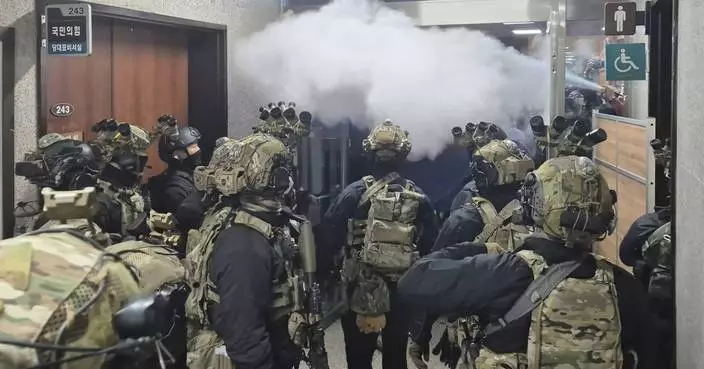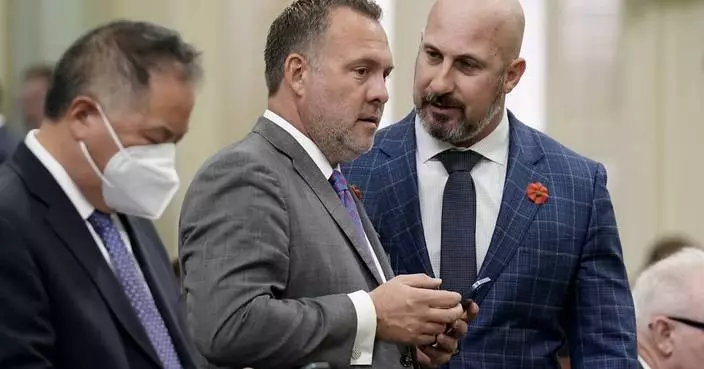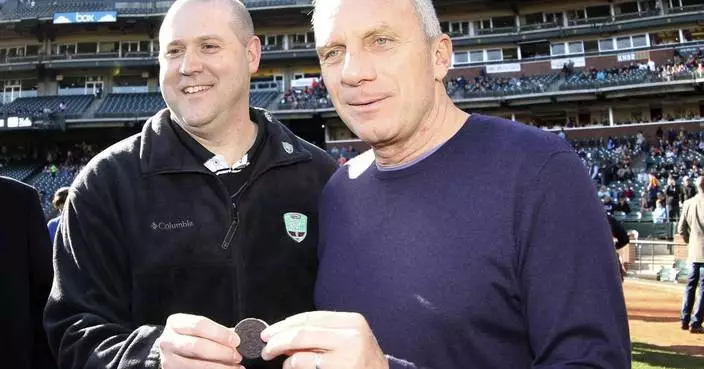BARCELONA, Spain (AP) — A Spanish court has upheld a ruling that a supermarket worker was unlawfully fired for having eaten a croquette that was going to be thrown away after not having been sold from the store’s deli section.
The worker was fired in July 2023 after he had snarfed down the fried snack, which was destined for the trash after the store had closed for the day.
In a verdict that The Associated Press saw on Wednesday, the Superior Court of Castilla-La Mancha recently rejected an appeal by the supermarket chain Mercadona of a decision by a lower court in May 2024 in favor of the worker.
The company’s policy is that workers are prohibited from consuming any product found in the store without having paid for it previously.
But the superior court found that it was common practice for workers to snack on “ready to eat” food products that were going to be thrown away after closing hours. In its ruling, it also insisted in “the important detail that the worker didn’t eat an entire package of croquettes, but instead one single croquette” that was “not going to be put back on sale the following day.”
The lower court ruling in May determined that the worker be reinstated to his job and that the supermarket chain pay him 39,700 euros ($41,800) in lost wages. The higher court has now added that Mercadona also must pay the worker 600 euros ($633) for his legal fees.
Mercadona did not immediately respond to an email from the AP asking for comment on the case.
The court documents didn't indicate the flavor of the croquette, which in Spain is a popular food typically made from ham, chicken or cod.

Facade of a Mercadona supermarket in San Sebastian de los Reyes, on the outskirts of Madrid, Thursday, Nov. 20, 2024. (AP Photo/Bernat Armangue)
TOKYO (AP) — South Korea's President Yoon Suk Yeol faced parliamentary moves to impeach him after he sent heavily armed troops into Seoul's streets with his baffling and sudden declaration of martial law that harkened to the country’s past dictatorships.
Opposition parties submitted the impeachment motion just hours after parliament unanimously voted to cancel Yoon's declaration, forcing him to lift martial law about six hours after it began. Impeaching Yoon requires the support of two-thirds of the National Assembly and at least six of the nine Constitutional Court justices. The liberal opposition Democratic Party holds a majority in the 300-seat parliament and has called for Yoon's resignation.
A vote on impeachment motion could be as early as Friday, Democratic Party lawmaker Kim Yong-min said.
During the tense and shocking hours under martial law, heavily armed special operations forces surrounded the parliament, backed by army helicopters and armored vehicles. Lawmakers climbed walls to get into the building and held off troops by activating fire extinguishers. Politician and former news anchor Ahn Gwi-ryeong tried to pull away an assault rifle a soldier had pointed at her chest as she shouted: “Aren’t you ashamed of yourselves?”
The lawmakers who managed to reenter the building rejected Yoon’s martial law declaration 190-0, including 18 lawmakers from Yoon’s party, forcing Yoon to rescind it at a hastily assembled Cabinet meeting.
Here’s what to know about the situation in South Korea:
Yoon ordered martial law without warning in a speech late Tuesday where he vowed to eliminate “anti-state” forces he said were plotting rebellion and accused the main opposition parties of supporting the country’s rival, North Korea.
Yoon gave no direct evidence when he raised the specter of North Korea as a destabilizing force. Yoon has long maintained that a hard line against the North is the only way to stop Pyongyang from following through on its nuclear threats against Seoul.
In the late 1980s, South Korea had a series of strongmen who repeatedly invoked North Korea when struggling to control domestic dissidents and political opponents.
Yoon has struggled to get his agenda through an opposition-dominated parliament while corruption scandals involving him and his wife.
The opposition lambasted Yoon's actions as undemocratic. Opposition leader Lee Jae-myung, who narrowly lost to Yoon in the 2022 presidential election, called Yoon’s announcement “illegal and unconstitutional.”
The sudden declaration was also opposed by the leader of Yoon's own conservative party, Han Dong-hoon, who called the decision wrong and vowed to “stop it with the people.”
“The people will block the president’s anti-constitutional step. The military must be on the side of the public in any case. Let’s resolutely oppose it,” Kim Dong Yeon, the opposition party governor of Gyeonggi province, which surrounds Seoul, wrote on X.
Average South Koreans were in shock. Social media was flooded with messages expressing surprise and worry over Yoon’s announcement.
There were quick claims that the emergency declaration was linked to Yoon’s political struggles.
He has had little success in getting his policies adopted by a parliament that has been controlled by the opposition since he took over in 2022.
Conservatives have said the opposition moves are political revenge for investigations into Lee, who is seen as the favorite for the next presidential election in 2027.
Just this month, Yoon denied wrongdoing in an influence-peddling scandal involving him and his wife. The claims have battered his approval ratings and fueled attacks by his rivals.
The scandal centers on claims that Yoon and first lady Kim Keon Hee exerted inappropriate influence on the conservative ruling People Power Party to pick a certain candidate to run for a parliamentary by-election in 2022 at the request of Myung Tae-kyun, an election broker and founder of a polling agency who conducted free opinion surveys for Yoon before he became president.
Yoon has said he did nothing inappropriate.
South Korea became a democracy only in the late 1980s, and military intervention in civilian affairs is still a touchy subject.
During the dictatorships that emerged as the country rebuilt from the 1950-53 Korean War, leaders occasionally proclaimed martial law that allowed them to station combat soldiers, tanks and armored vehicles on streets or in public places to prevent anti-government demonstrations.
Such scenes are unimaginable for many today.
Dictator Park Chung-hee, who ruled South Korea for nearly 20 years before he was assassinated by his spy chief in 1979, led several thousand troops into Seoul in the early hours of May 16, 1961, in the country’s first coup. He proclaimed martial law several times to stop protests and jail critics.
Less than two months after Park’s death, Maj. Gen. Chun Doo-hwan led tanks and troops into Seoul in December 1979 in the country’s second coup. The next year, he orchestrated a brutal military crackdown on a pro-democracy uprising in the southern city of Gwangju, killing at least 200 people.
In the summer of 1987, massive street protests forced Chun’s government to accept direct presidential elections. His army buddy Roh Tae-woo, who had joined Chun’s 1979 coup, won the election held later in 1987 thanks largely to divided votes among liberal opposition candidates.
AP writers Kim Tong-hyung and Hyung-jin Kim in Seoul, South Korea, contributed to this story.
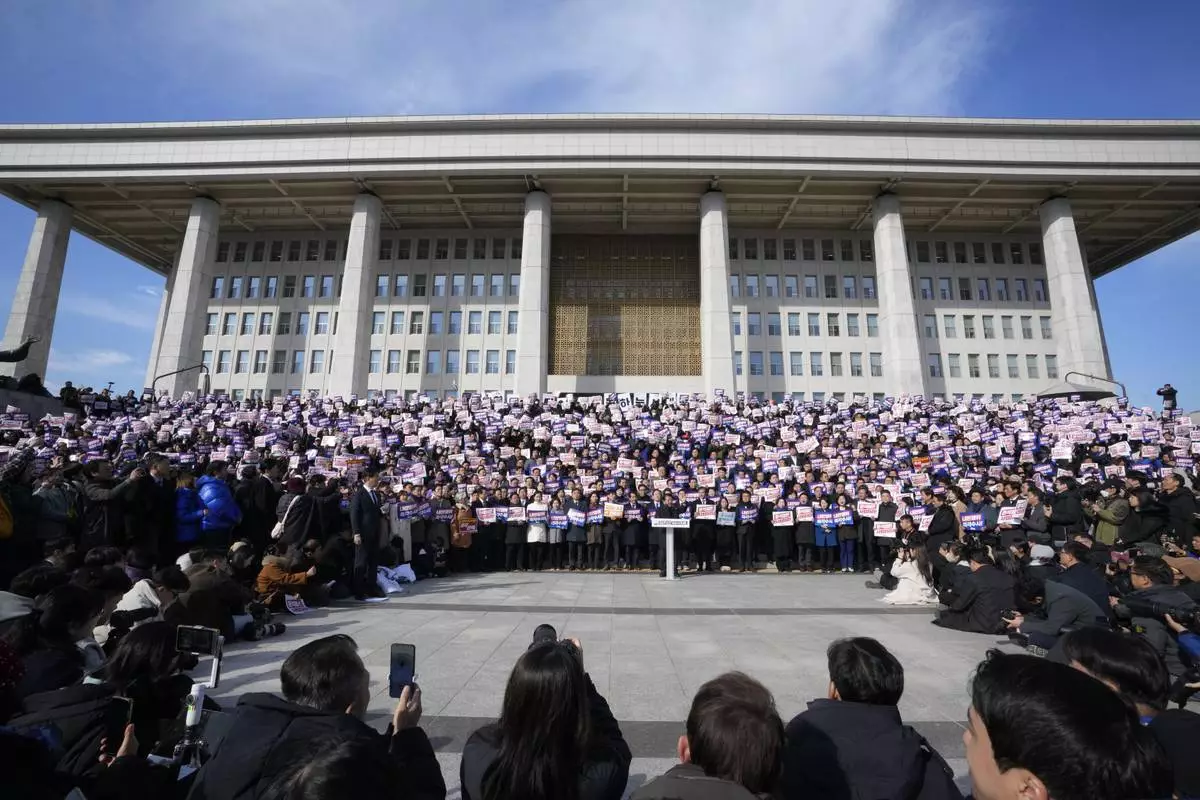
Members of main opposition Democratic Party stage a rally against South Korean President Yoon Suk Yeol at the National Assembly in Seoul, South Korea, Wednesday, Dec. 4, 2024. (AP Photo/Ahn Young-joon)
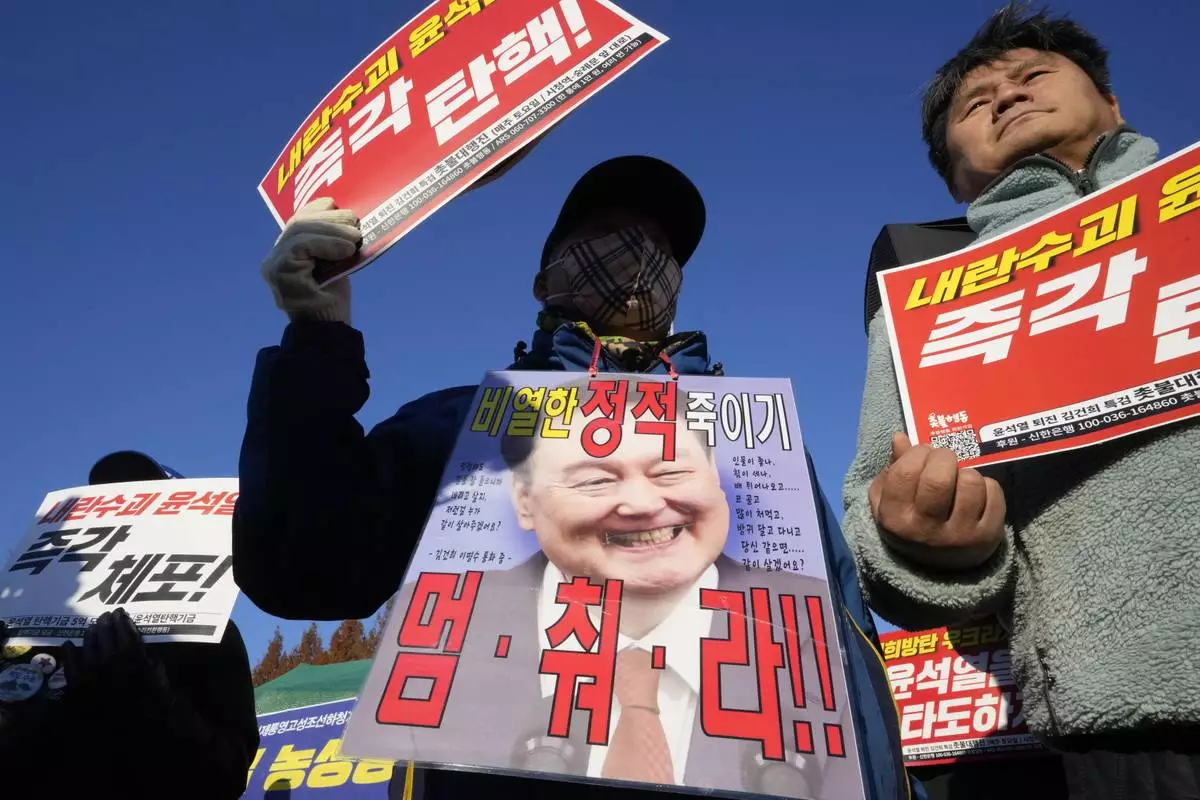
Protesters attend a rally to demand South Korean President Yoon Suk Yeol to step down in front of the National Assembly in Seoul, South Korea, Wednesday, Dec. 4, 2024. The signs read "Stop." (AP Photo/Ahn Young-joon)
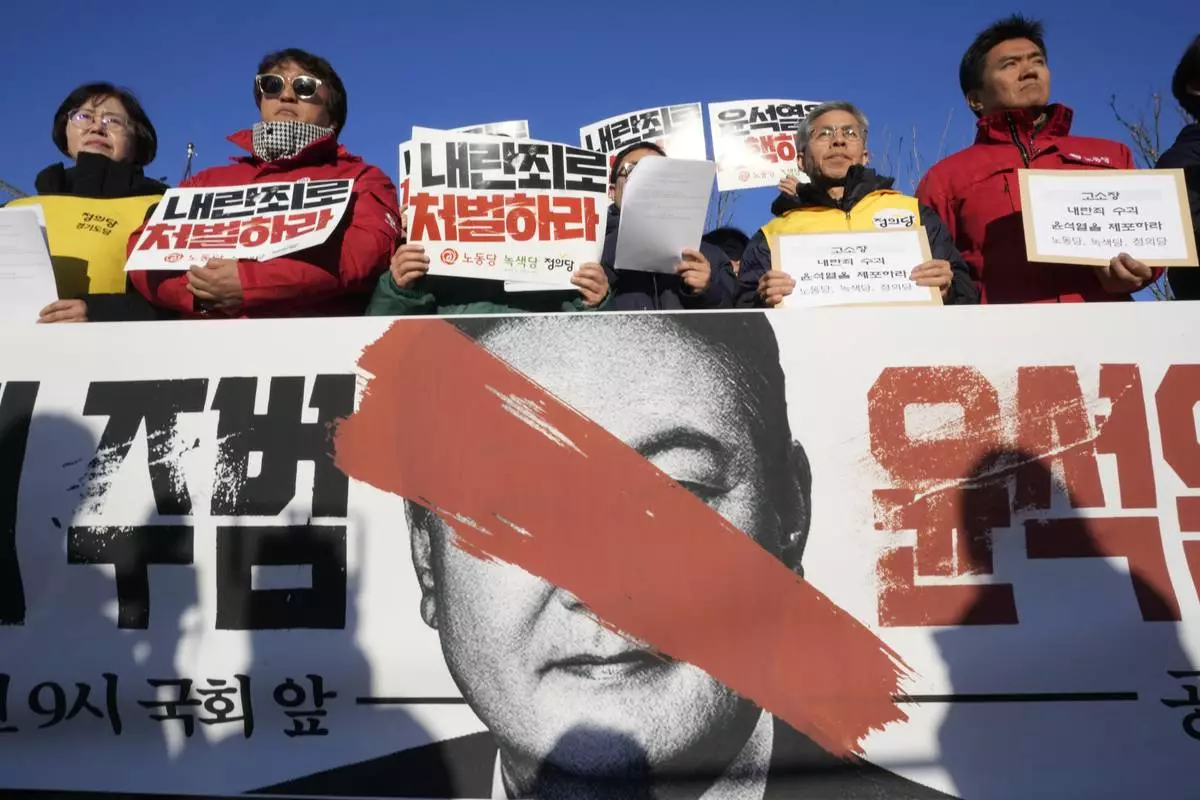
Protesters stage a rally to demand South Korean President Yoon Suk Yeol to step down in front of the National Assembly in Seoul, South Korea, Wednesday, Dec. 4, 2024. The signs read "Punish." (AP Photo/Ahn Young-joon)
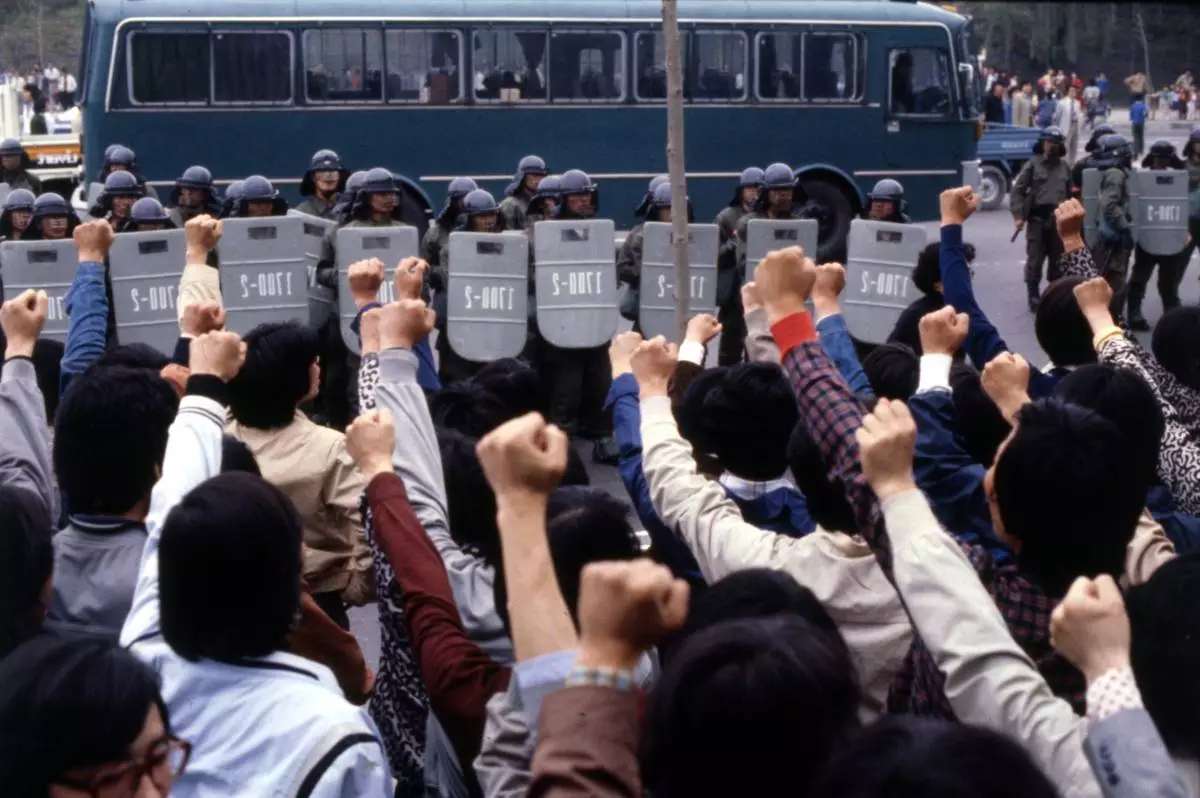
FILE - Mass students demonstrators demand the lifting of martial law and the resignation of Premier Shin Hyon-Hwack and Korean Central Intelligence chief Lt. Gen. Chun Doo-Hwan, in May 1980. (AP Photo, File)
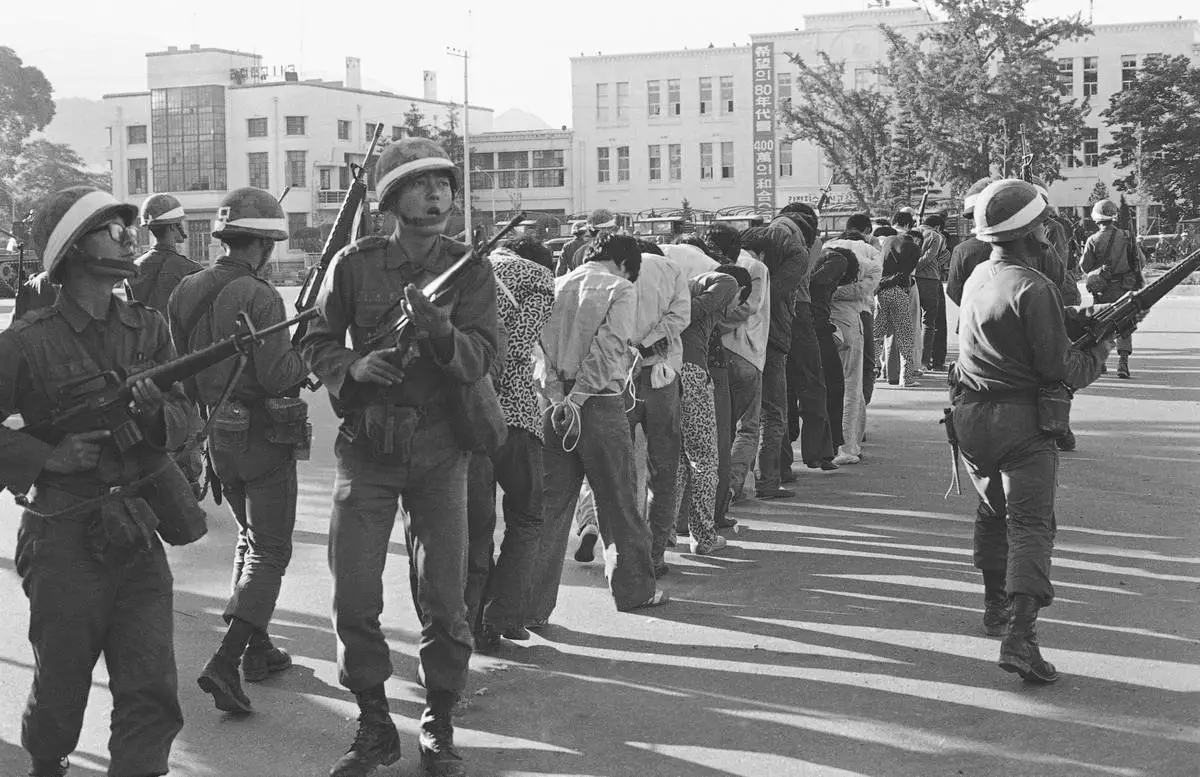
FILE - Armed South Korean government martial law troops guard captured rebels in Gwangju (Kwangju), South Korea, on May 27, 1980. The rebels were rounded up following the government's recapture by the riot-battered city. (AP Photo/Sadayuki Mikami, File)
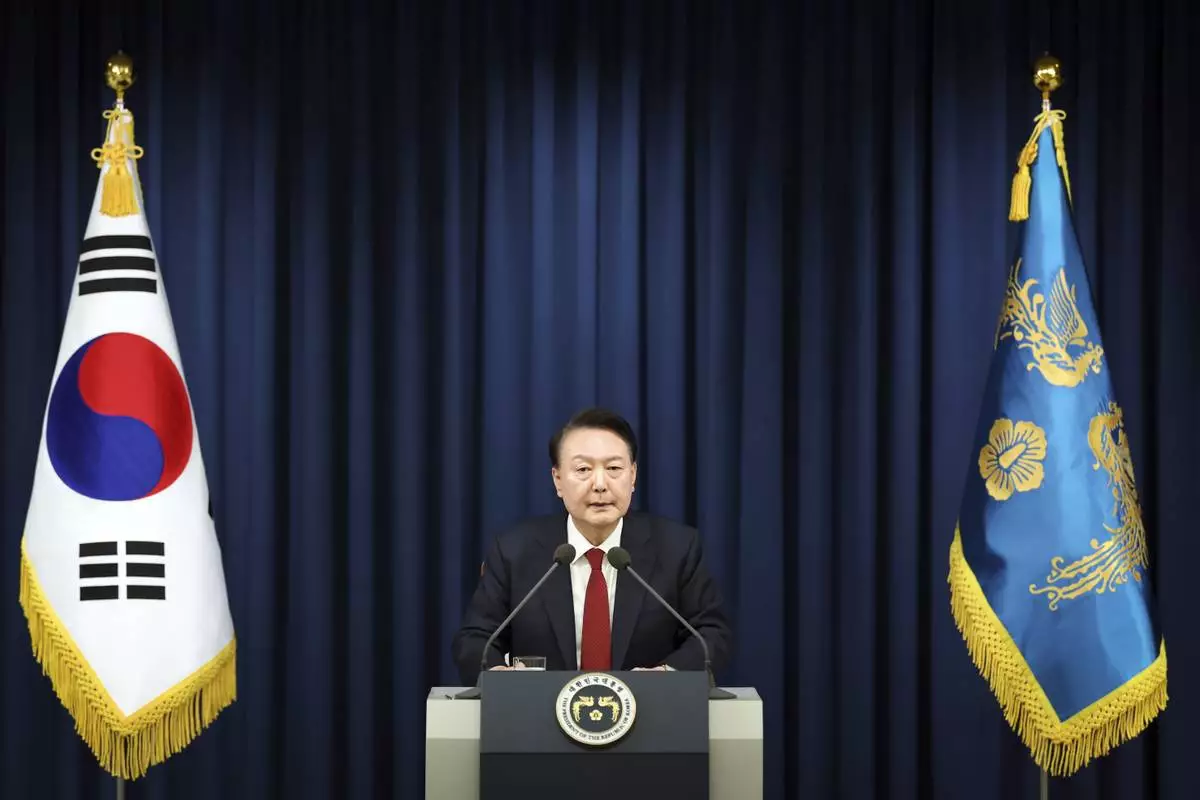
In this photo provided by South Korea Presidential Office, South Korean President Yoon Suk Yeol speaks during a press briefing at the presidential office in Seoul, South Korea, Tuesday, Dec. 3, 2024. (South Korea Unification Ministry via AP).
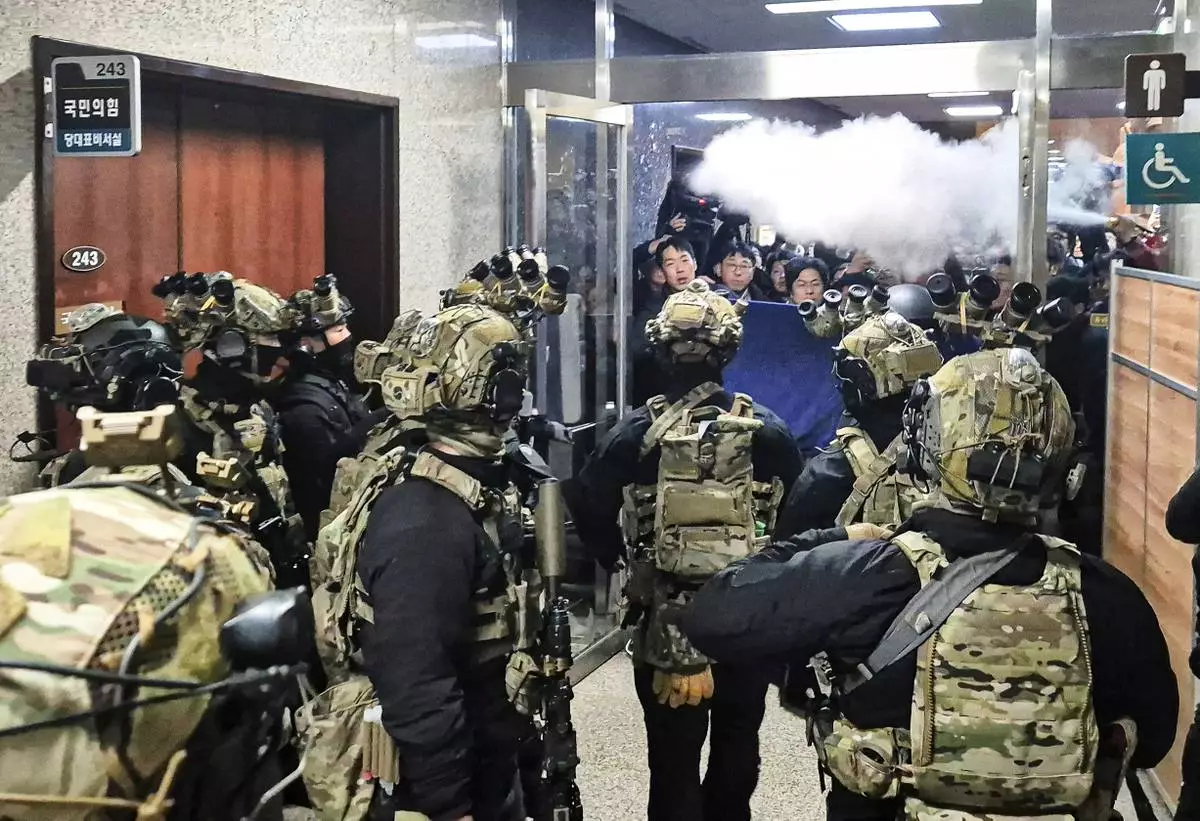
A National Assembly staff sprays fire extinguishers to block soldiers entering the main hall of the National Assembly in Seoul, South Korea, Wednesday, Dec. 4, 2024. (Jo Da-un/Yonhap via AP)
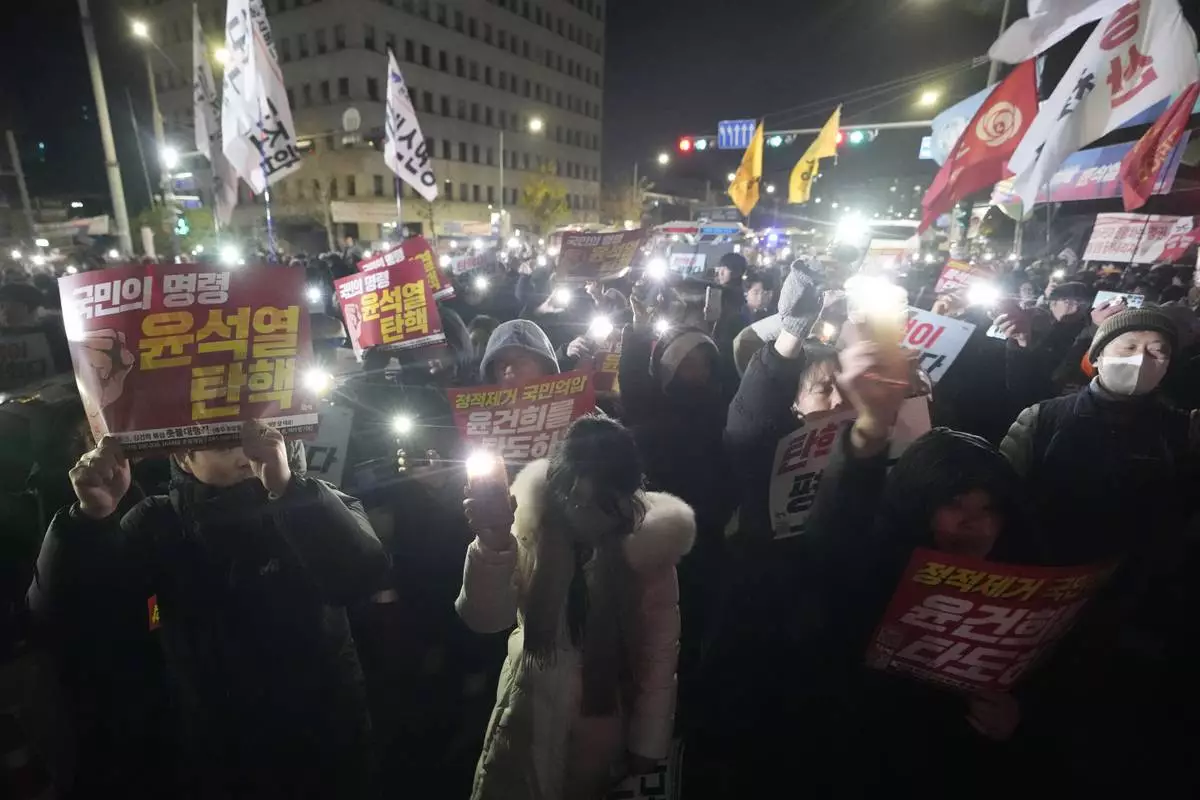
People gather to demand South Korean President Yoon Suk Yeol to step down in front of the National Assembly in Seoul, South Korea, Wednesday, Dec. 4, 2024. (AP Photo/Ahn Young-joon)
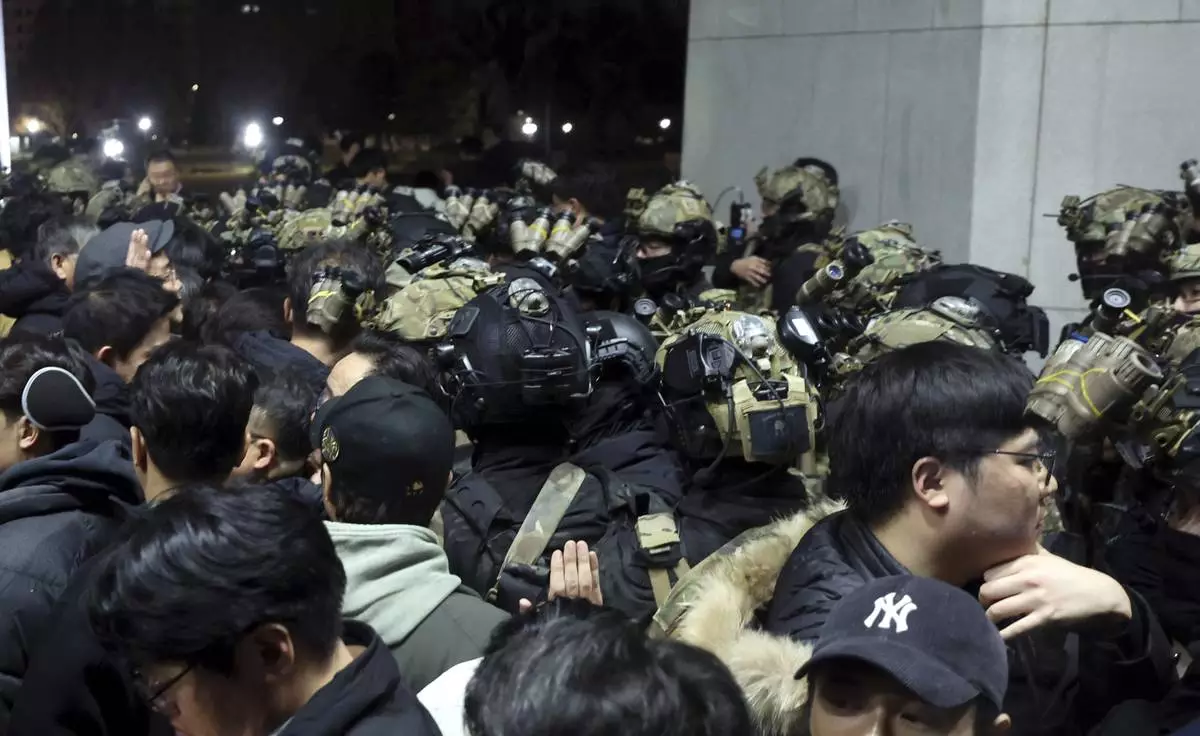
South Korean martial law soldiers try to enter the National Assembly compound in Seoul, South Korea, Wednesday, Dec. 4, 2024. (Cho Sung-bong/Newsis via AP)
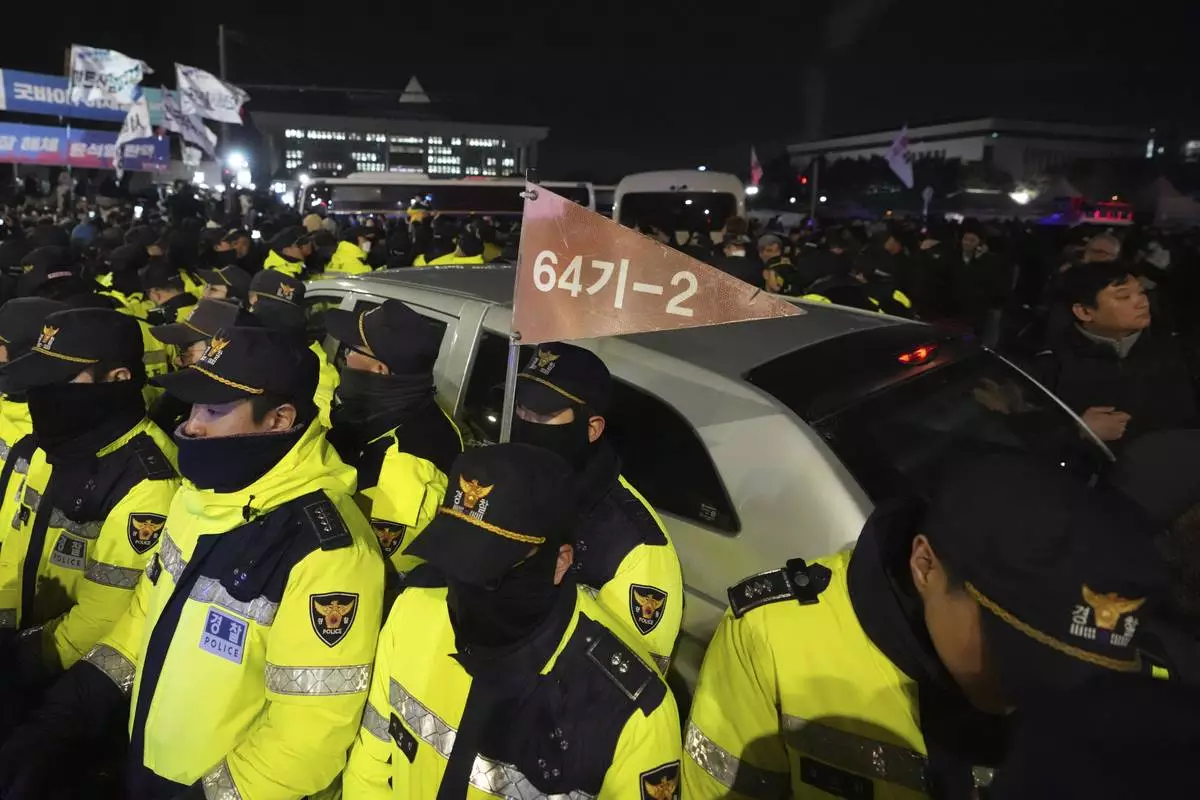
Police officers stand outside the National Assembly in Seoul, South Korea, Wednesday, Dec. 4, 2024. (AP Photo/Lee Jin-man)















